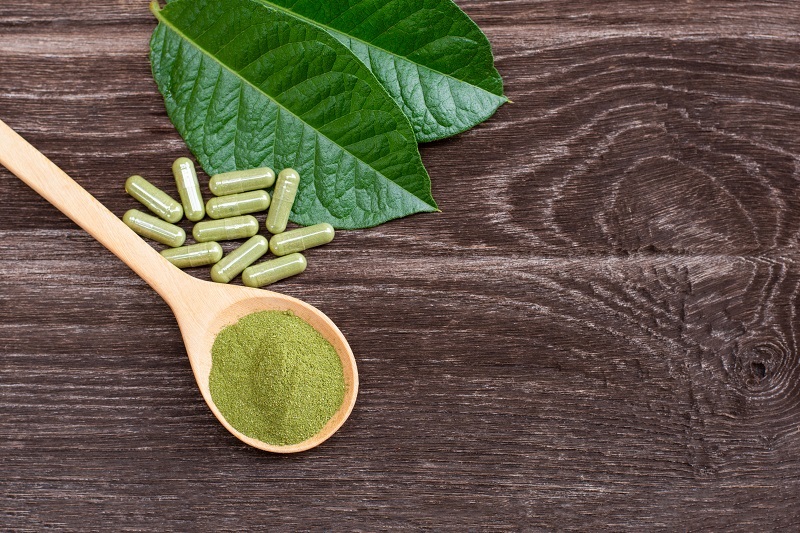Kratom: What Are The Health Benefits vs. Risks?

June 23, 2023
Kratom is a dietary supplement that may make people feel energized or relaxed. Before you try it, know that different government agencies have warned against kratom use.
The U.S. Food and Drug Administration (FDA) says that kratom may be addictive. The U.S. Drug Enforcement Administration (DEA) says that kratom may cause psychological and physiological dependence.
Concerns about kratom abound because it’s believed to act on opioid brain receptors. Some research suggests that consistent kratom usage causes withdrawal symptoms, like opioids do.
“Kratom has been shown to cause dependence, leading to withdrawal symptoms, and in the past few years, we’ve seen more and more admissions for kratom detox,” social worker and director of Substance Use Counseling Services at Blake Recovery Center, Michele Scasserra, LCSW, LCADC, CCS says.
What is Kratom?
Kratom (Mitragyna speciosa) is a plant that grows in Southern Asia. People use the leaves to make substances that can be ingested or smoked.
In the U.S., it’s possible to purchase kratom in these forms:
- Pills
- Capsules
- Powder
- Tea
- Raw leaves
- Liquid extract
“The growing and widespread availability of kratom is also of great concern,” adds Michele. “Depending on the state, those who are 18 or 21 can buy the substance in local smoke shops, online and even in convenience stores.”
Some people chew on raw leaves, while others smoke the leaves. Powder or liquid extract may be added to food or beverages.
People seeking kratom may want to increase their energy, relieve pain or sedate themselves. The effects of kratom may change, depending on the size of the dose.
However, using any amount of kratom may not be safe. The DEA calls kratom a “drug of concern” because it may be abused.
Trying kratom is a poor choice, because of how it reacts with brain receptors. You may become dependent on kratom, despite your best intentions.
Possible Health Benefits of Kratom
Some people look for kratom because they have heard of its many possible benefits. But little research has been conducted, so confirmation of supposed benefits may be lacking.
The FDA doesn’t have authority to approve the safety and effectiveness of dietary supplements. So it’s uncertain if kratom may be effective when taken to treat certain conditions.
People in Asia, where kratom is grown, have used kratom for over a century. They believe that it prevents diarrhea, decreases pain, aids opioid withdrawal and enhances libido.
Many people in the U.S. who seek kratom hope that it may:
- Increase energy levels
- Relieve pain
- Improve mental health conditions
- Provide feelings of pleasure or euphoria
- Ease cravings for opioid drugs
Health experts are concerned about the potential for kratom to harm opioid drug users. Rather than being useful for opioid withdrawal, experts believe it may cause addiction.
Possible Health Risks Associated With Kratom
Some people think that kratom is safe to try because it’s plant-based. But other plant-based substances are harmful, including cocaine and opium.
Because it hasn’t been well-studied, experts don’t know kratom’s potential long-term effects. In the short term, kratom may cause a number of harmful effects.
Combining kratom with caffeine, alcohol or drugs – including opioids – may prove to be lethal.
Kratom may cause symptoms such as:
- Sweating
- Dry mouth
- Rapid heartbeat
- Itchiness
- Increased urination
- Constipation
- Nausea and vomiting
- Loss of appetite
- Weight loss
- Insomnia
- Drowsiness
- Confusion
- Delusions
- Seizures
- Hallucinations
- Death
“I would recommend that any patient who was considering using kratom to reconsider,” Michele says. “There are too many negatives, which outweigh any possible positives.”
Next Steps & Resources:
- Meet our source: Michele Scasserra, LCSW, LCADC, CCS
- Learn more about addiction treatment resources at Hackensack Meridian Health.
- To make an appointment with a behavioral health specialist near you, call 800-822-8905 or visit our website.
The material provided through HealthU is intended to be used as general information only and should not replace the advice of your physician. Always consult your physician for individual care.






